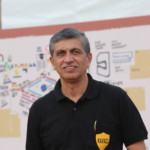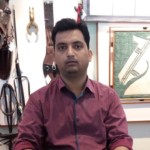



Industry Voice
 A Kandasamy, Managing Partner, Smatu Footwear, Chennai, Tamilnadu
A Kandasamy, Managing Partner, Smatu Footwear, Chennai, Tamilnadu
“Skill development is the need of the nation. We employ skilled workers to ensure quality. We are in this leather field for more than 15 years with a production capacity of 600 to 700 pairs per day. As we export we are more particular regarding the quality and timely delivery in all our commitments which can be achieved only through motivated and dedicated workforce. This can be ensured through good training programs. We have also employed stitchers who had been trained under PMKVY”.
 Shiva Gupta, Director, S. G. World, Agra
Shiva Gupta, Director, S. G. World, Agra
We are a startup and we are planning for online stores and exports. Our main focus is on women’s footwear with competitive pricing. We find it difficult to get skilled people in our field so we train them ourselves. There is a lot of attrition too as there is no unity among the leather companies and we feel there should be certain rules formulated to control this. I would like to tell the youth to come into this industry since there is lot of scope and take risks in life.
 Abhishek Mishra, Quality Head, Le Mak Exports Pvt. Ltd. Agra
Abhishek Mishra, Quality Head, Le Mak Exports Pvt. Ltd. Agra
We have about 500 – 600 employees in our company. We make riding boots and fashion goods.The biggest challenge we face is getting skilled manpower. We have to provide training as we don’t always find trained people. Our existing staff trains new people. We also make them enrol in FDDI courses. I believe in the South Indian states training is better as it is more technology-driven. It will be good if we can get similar training here develop competent manpower for our companies.
 Satish Burde, General Manager, Namaste Exports Limited
Satish Burde, General Manager, Namaste Exports Limited
The PMKVY course was useful in more way than one. It helped in training our workforce from the perspective of production and output.It helped them realise the importance of value addition to the product by optimum utilisation of the resources provided to them be viz material, time, equipment and tools. The practical training coupled with classroom sessions were complementing each other. Recognition of skills and subsequent training will enhance the ownership of the work undertaken. It also helps to establish in affirmative way that quality of work is of utmost importance and skilling in a professional way is the only way to achieve it.
 Amir Awsaf, Management Representative, Kings International, Unnao
Amir Awsaf, Management Representative, Kings International, Unnao
Saddlery is a hand-crafted item and we depend on hand-stitching skills. People are rare to find with these skills, since they have other employment options. We conduct training for 6 months with the help of supervisors and other qualified persons. We also conduct training program with the help of LSSC and take learners’ feedback to understand the difficulties. We collaborate with UNIDO to conduct workshops on health and safety of tannery workers. Besides, our training also includes modules on machine maintenance with focus on quality outcomes.
 Bipin Kumar Gupta, Sr. Manager Compliance, Karam Udyog, Agra
Bipin Kumar Gupta, Sr. Manager Compliance, Karam Udyog, Agra
We are into men’s leather footwear and we have 1000 employees. I have 15 years of industry experience. For training, we depend on CFTI and we also conduct on the job training on our premises. The main challenge is to train the local people who have not worked in the footwear industry. If they get trained in Marking, Skiving and other skills, it would be beneficial. Otherwise it takes 5 to 6 months to train them. Design training is done at our R&D center and execution level training is offered in cutting, skiving, printing, upper making and packing. It would be good if we get to train them from college level.
 Prashant Pandey, Director, A. M. Enterprises, Unnao
Prashant Pandey, Director, A. M. Enterprises, Unnao
We get trained workers for job work, since the industry has been here for long, we can get them from FDDI which is close to Unnao. Cutting and closing skills are in great demand in our area. We don’t get any help from the government. We make uppers and cater the the market demand. In Unnao, 70% people are in the leather industry, and we use contractors to get the workers. People from FDDI come and train, if needed.